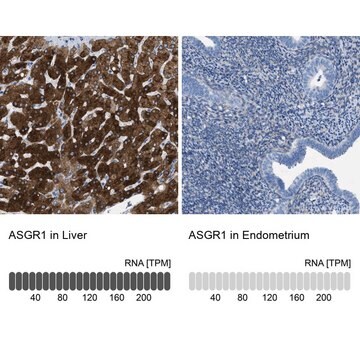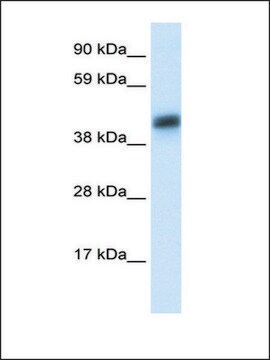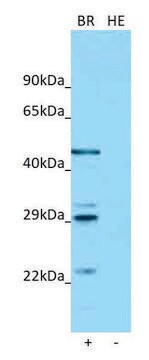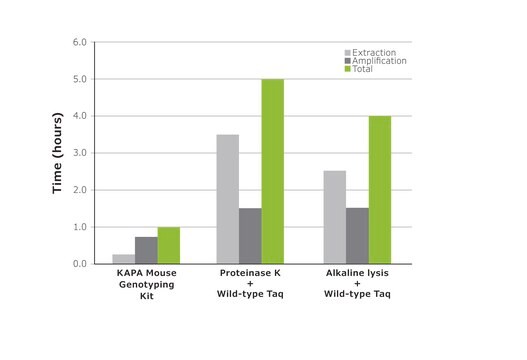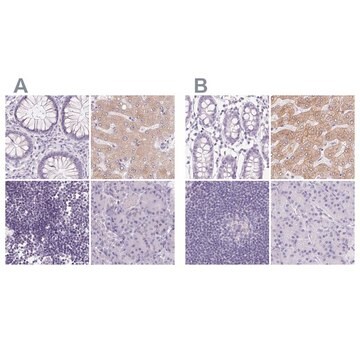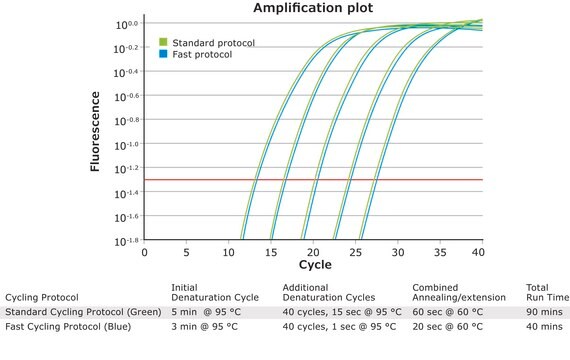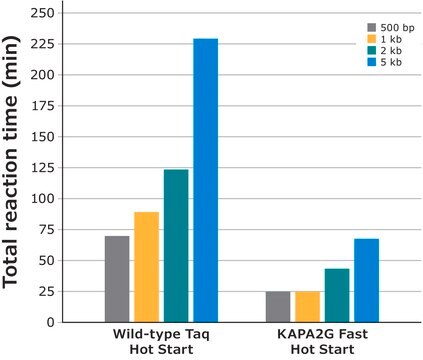推荐产品
生物源
rabbit
品質等級
共軛
unconjugated
抗體表格
affinity isolated antibody
抗體產品種類
primary antibodies
無性繁殖
polyclonal
產品線
Prestige Antibodies® Powered by Atlas Antibodies
形狀
buffered aqueous glycerol solution
物種活性
human
加強驗證
recombinant expression
independent
orthogonal RNAseq
Learn more about Antibody Enhanced Validation
技術
immunoblotting: 0.04-0.4 μg/mL
immunofluorescence: 0.25-2 μg/mL
immunohistochemistry: 1:1000-1:2500
免疫原序列
RETFSNFTASTEAQVKGLSTQGGNVGRKMKSLESQLEKQQKDLSEDHSSLLLHVKQFVSDLRSLSCQMAALQGNGSERTCCPVNWVEHERSCYWFSRSGKAWADADNYCRLEDAHLVVVTSWE
UniProt登錄號
運輸包裝
wet ice
儲存溫度
−20°C
目標翻譯後修改
unmodified
基因資訊
human ... ASGR1(432)
一般說明
Asialoglycoprotein receptor 1 (ASGR1) is a transmembrane protein. It is a subunit of the asialoglycoprotein receptor. The gene encoding this protein is located on human chromosome 17.
免疫原
Asialoglycoprotein receptor 1 recombinant protein epitope signature tag (PrEST)
應用
All Prestige Antibodies Powered by Atlas Antibodies are developed and validated by the Human Protein Atlas (HPA) project and as a result, are supported by the most extensive characterization in the industry.
The Human Protein Atlas project can be subdivided into three efforts: Human Tissue Atlas, Cancer Atlas, and Human Cell Atlas. The antibodies that have been generated in support of the Tissue and Cancer Atlas projects have been tested by immunohistochemistry against hundreds of normal and disease tissues and through the recent efforts of the Human Cell Atlas project, many have been characterized by immunofluorescence to map the human proteome not only at the tissue level but now at the subcellular level. These images and the collection of this vast data set can be viewed on the Human Protein Atlas (HPA) site by clicking on the Image Gallery link. We also provide Prestige Antibodies® protocols and other useful information.
The Human Protein Atlas project can be subdivided into three efforts: Human Tissue Atlas, Cancer Atlas, and Human Cell Atlas. The antibodies that have been generated in support of the Tissue and Cancer Atlas projects have been tested by immunohistochemistry against hundreds of normal and disease tissues and through the recent efforts of the Human Cell Atlas project, many have been characterized by immunofluorescence to map the human proteome not only at the tissue level but now at the subcellular level. These images and the collection of this vast data set can be viewed on the Human Protein Atlas (HPA) site by clicking on the Image Gallery link. We also provide Prestige Antibodies® protocols and other useful information.
生化/生理作用
As part of the asialoglycoprotein receptor, asialoglycoprotein receptor 1 (ASGR1), mediates the endocytosis and degradation of plasma glycoconjugates, containing terminal galactosyl or N-acetylgalactosaminyl residues, with the help of a coated pit pathway. It has been shown to be expressed in human hepatocellular carcinoma.
特點和優勢
Prestige Antibodies® are highly characterized and extensively validated antibodies with the added benefit of all available characterization data for each target being accessible via the Human Protein Atlas portal linked just below the product name at the top of this page. The uniqueness and low cross-reactivity of the Prestige Antibodies® to other proteins are due to a thorough selection of antigen regions, affinity purification, and stringent selection. Prestige antigen controls are available for every corresponding Prestige Antibody and can be found in the linkage section.
Every Prestige Antibody is tested in the following ways:
Every Prestige Antibody is tested in the following ways:
- IHC tissue array of 44 normal human tissues and 20 of the most common cancer type tissues.
- Protein array of 364 human recombinant protein fragments.
聯結
Corresponding Antigen APREST72013
外觀
Solution in phosphate-buffered saline, pH 7.2, containing 40% glycerol and 0.02% sodium azide
法律資訊
Prestige Antibodies is a registered trademark of Merck KGaA, Darmstadt, Germany
免責聲明
Unless otherwise stated in our catalog or other company documentation accompanying the product(s), our products are intended for research use only and are not to be used for any other purpose, which includes but is not limited to, unauthorized commercial uses, in vitro diagnostic uses, ex vivo or in vivo therapeutic uses or any type of consumption or application to humans or animals.
未找到合适的产品?
试试我们的产品选型工具.
儲存類別代碼
10 - Combustible liquids
水污染物質分類(WGK)
WGK 1
閃點(°F)
Not applicable
閃點(°C)
Not applicable
個人防護裝備
Eyeshields, Gloves, multi-purpose combination respirator cartridge (US)
V É Sagynbaeva et al.
Eksperimental'naia i klinicheskaia gastroenterologiia = Experimental & clinical gastroenterology, (8)(8), 45-49 (2013-01-01)
Among 106 patients with autoimmune liver disease in 12 (11.3%) were found autoantibodies to asialoglycoprotein receptor (anti-ASGPR): in 5 (9.1%) of 55 with PBC, and 4 (17.4%) of 23 with AIH and 3 (10.7%) of 28 patients with syndrome chiasm
F Y Zeng et al.
The Journal of biological chemistry, 271(50), 32454-32460 (1996-12-13)
Functional rat or human asialoglycoprotein receptors (ASGP-Rs) are hetero-oligomeric integral membrane glycoproteins. Rat ASGP-R contains three subunits, designated rat hepatic lectins (RHL) 1, 2, and 3; human ASGP-R contains two subunits, HHL1 and HHL2. Both receptors are covalently modified by
H F Lodish
Trends in biochemical sciences, 16(10), 374-377 (1991-10-01)
The hepatic asialoglycoprotein receptor, a galactose lectin, is an oligomer of two types of similar polypeptide chains, each of which weakly binds galactose. High-affinity binding of complex oligosaccharides requires a precise geometric arrangement of receptor subunits. The two subunits have
Akira Takeya et al.
Life sciences, 80(6), 538-545 (2006-11-14)
Hepatic asialoglycoprotein receptor, which may mediate the clearance of circulating thyroglobulin, is known to have a high affinity for GalNAc. Recently, the receptor has been reported to be present also in the thyroid, implicating interaction with thyroglobulin. Here, mammalian thyroglobulins
Bin Shi et al.
The journal of histochemistry and cytochemistry : official journal of the Histochemistry Society, 61(12), 901-909 (2013-08-28)
Human hepatocellular carcinoma (HCC) is the fifth most common cancer in the world. Currently, surgical resection is the only effective treatment for HCC if the tumor is resectable. Small molecule, biologics and siRNA anti-cancer drugs have been explored for the
Global Trade Item Number
| 货号 | GTIN |
|---|---|
| HPA012852-100UL | 4061837126352 |
| HPA012852-25UL | 4061842785803 |
我们的科学家团队拥有各种研究领域经验,包括生命科学、材料科学、化学合成、色谱、分析及许多其他领域.
联系客户支持
